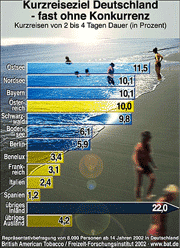Despite the travel slump: Germany as a short holiday destination - almost without competition
"Short trips to local destinations are in demand. What has long applied to the consumption of experiences in everyday life - 'experience more in less time' - also applies to short holidays," says Professor Dr Horst W. Opaschowski, Director of the B-A-T Institute. "A second travel market of short times and short distances is emerging. A great opportunity for Germany as a short holiday destination - and not just since 11 September." Young adults aged 18 to 24 (53%) and childless couples (49%) are over-represented among short-break travellers. People with a net household income of over €2,500 (53%) and higher educated people with a secondary school diploma (56%) or higher education (55%) are also particularly well represented among short-break travellers.
Short breaks: More Baltic and North Sea than Mallorca and Verona
Germany is the Germans' favourite short break destination - with almost no competition. This includes lakes and mountains in the immediate vicinity as well as domestic cultural metropolises. The Baltic Sea (11.5%) and North Sea (10.1%) as well as the Black Forest (9.8%) and Bavarian mountains (10.1%) top the rankings for German short-break travellers.
In comparison, foreign destinations such as France (3.1%), Italy (2.4%) and Spain (1.2%) lag far behind. The three countries Belgium, the Netherlands and Luxembourg together account for just 3.4 per cent. Neighbouring Austria is the only exception, with a market share of ten percent, holding its own alongside domestic short-haul destinations.
In critical and economically difficult times, short breaks offer a successful combination of nature, wellness, culture and culinary delights. They attract short-break tourists who want to see, experience and enjoy almost as much as on their main holiday in less time. Short-break travellers move between sand dunes and chalk cliffs, musicals and world heritage sites, fitness and anti-ageing arrangements, rustic cuisine and culinary highlights. Flexible offers from local holiday regions that are not tied to a rigid weekly rhythm ("arrive on Saturdays") pay off.
"A short holiday from marriage? No, thanks"
The following applies to short breaks when travelling: better together than alone. Half of short-break holidaymakers (50%) travel with their spouse/life partner. A further 18 per cent are travelling with their partner and children. Professor Opaschowski: "The family also proves to be the most important reference group on short holidays. Some focus on their togetherness, while for others the short trip becomes a family experience. Quite conventional and traditional - the 'holiday from marriage' is a legend." In contrast, the sometimes noisy association and club holidays almost lead a shadowy existence (7%). Hardly anyone still travels alone: even two thirds of singles (64%) only set off when they have found friends, a circle of friends or a clique as travelling companions for their short holiday. Like-minded people replace the family on a short holiday.
Technical data of the surveys
Representative survey on the intensity of short trips/travelling partners:
Survey period: 23 April to 25 May 2002
Number of respondents: 3,000 people aged 14 and over
Representative survey on short holiday destinations:
Survey period: 8 January to 1 February 2002
Number of respondents: 8,000 people aged 14 and over



